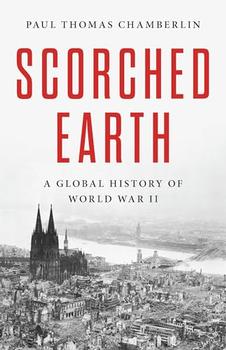
A Global History of World War II
by Paul Thomas Chamberlin
A powerful, unsparing new history of World War II, recasting the conflict as a brutal struggle for survival among declining and ascendant imperial powers.
In popular memory, the Second World War was an unalloyed victory for freedom over totalitarianism, marking the demise of the age of empires and the triumph of an American-led democratic order.
In Scorched Earth, historian Paul Thomas Chamberlin dispatches the myth of World War II as a good war. Instead, he depicts the conflict as it truly was: a massive battle beset by vicious racial atrocities, fought between rival empires across huge stretches of Asia and Europe. The war was sparked by German and Japanese invasions that threatened the old powers' dominance, not by Allied opposition to fascism. The Allies achieved victory not through pluck and democratic idealism but through savage firebombing raids on civilian targets and the slaughter of millions of Soviet soldiers. The Soviet Union and the United States emerged as hyper-militarized new imperial powers, each laying claim to former Axis holdings across the globe before turning on one another and triggering a new forever war.
Dramatically rendered and persuasively argued, Scorched Earth shows that World War II marked the culmination of centuries of colonial violence and ushered in a new era of imperial struggle.
"A fresh, closely argued interpretation of a global conflict that continues to reverberate." —Kirkus Reviews (starred review)
"If doubts remain that World War II was the most devastating conflict in human history, Scorched Earth dispels them. Even more, Paul Thomas Chamberlin challenges the basic notion of a struggle between good and evil. There is little good here except that this war of annihilation finally ended after taking its tremendous toll. And while historians have long identified World War II as a seminal influence on our contemporary era, none have effectively argued that colonialism in its varied versions was its ultimate legacy—until now. In previous work, Chamberlin contested Cold War realism; likewise, here he upends common assumptions about the Good War. He demythologizes in a way that eloquently covers this epic conflict in all its details—experts and war buffs will find a lot of battle descriptions that are fresh here—while provoking us to rethink our understanding of history itself. Truly a tour de force!" ―Thomas W. Zeiler, author of Annihilation: a Global Military History of World War II
"A well written, balanced, and provocative account of the twentieth century's greatest and most destructive war. Paul Thomas Chamberlin covers all the major theaters of the war, smoothly integrating political and military developments. The author's unorthodox interpretation of the Second World War will challenge historians to reexamine long-standing assumptions and beliefs about the origins and nature of this critical conflict." ―Ronald H. Spector, author of Eagle Against the Sun
This information about Scorched Earth was first featured
in "The BookBrowse Review" - BookBrowse's membership magazine, and in our weekly "Publishing This Week" newsletter. Publication information is for the USA, and (unless stated otherwise) represents the first print edition. The reviews are necessarily limited to those that were available to us ahead of publication. If you are the publisher or author and feel that they do not properly reflect the range of media opinion now available, send us a message with the mainstream reviews that you would like to see added.
Any "Author Information" displayed below reflects the author's biography at the time this particular book was published.
Paul Thomas Chamberlin is an associate professor in history at Columbia University. The author of The Cold War's Killing Fields and The Global Offensive, his writing has appeared in the New York Times, Washington Post, and Christian Science Monitor. He lives in New York.
Your guide toexceptional books
BookBrowse seeks out and recommends the best in contemporary fiction and nonfiction—books that not only engage and entertain but also deepen our understanding of ourselves and the world around us.